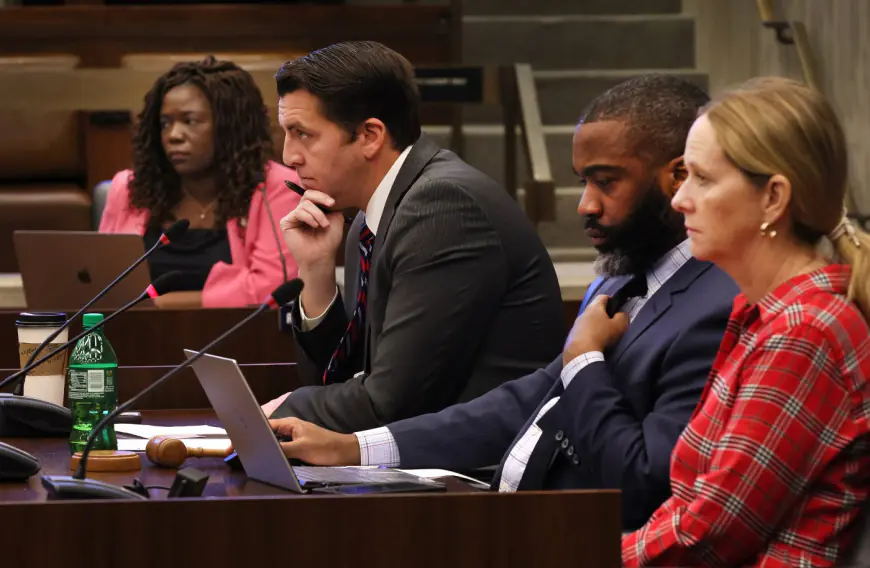Boston city councilors tangle with assessing chief over City Hall withholding tax data
Boston’s assessing chief laid out a tight timeline for state lawmakers to act on the mayor’s controversial plan to raise commercial tax rates, while refusing to share data sought by the senator who blocked the bill, frustrating some city councilors.

Boston’s assessing chief laid out a tight timeline for state lawmakers to act on the mayor’s controversial plan to raise commercial tax rates, while refusing to share data sought by the senator who blocked the bill, frustrating some city councilors.
Several members of the Boston City Council tangled with Nicholas Ariniello, the city’s assessing commissioner, at a Tuesday tax classification hearing, for his refusal to provide Department of Revenue-certified data that would shed light on what next year’s tax rates would be for residential and commercial properties.
At the same time, Ariniello requested that the Council vote to set tax rates next Wednesday, despite those rates being unclear to the body and subject to change depending on whether the Senate approves the mayor’s tax shift bill.
State Sen. Nick Collins, a South Boston Democrat, had delayed a Senate vote on the mayor’s tax bill on Monday, in part, because he was awaiting certified valuation data from the city that he was expecting to emerge during the Council hearing.
“Though city officials refused to share the data on new valuations submitted to the state at today’s Council hearing, they did indicate they anticipate a surplus from the new valuations,” Collins said in a statement. “Surplus funds should be directed toward residential tax relief, particularly for our seniors. In the interest of transparency and fiscal responsibility, the city needs to share their valuation data before action is taken on their plans to increase taxes.”
Ariniello laid out a tight turnaround for action to be taken on the mayor’s tax plan, saying that a further delay beyond Dec. 9 for Senate action, Dec. 10 for the governor’s signature and Dec. 11 for a Council vote to set tax rates, would impact the city’s timeline for sending out tax bills by the end of December.
The day’s discussion at the hearing was broad in nature, with two scenarios presented, depending on how the Senate acts on the city’s tax bill. The House passed the legislation on a third try, after it was delayed twice by a Republican representative from Norwell, David DeCoste, who cited economic concerns.
If the legislation were to pass, the Council would be asked by the Wu administration to set the maximum tax shift under the home rule petition, of 181.5% with the maximum residential exemption. If it were not to pass, the city’s request would be to set the shift at the current state limit of 175%.
Uncertainty around concrete numbers to support those two scenarios drew a sharp exchange between City Councilor Erin Murphy and Ariniello, after Murphy asked Ariniello to share the city’s updated property valuation data, saying that the “State House held off a vote yesterday because they’re waiting for the real numbers.”
Ariniello said that while he couldn’t answer the State House question, “as to their motives,” and he was still relatively comfortable with the projections the city released earlier this fall, he insisted that providing updated information that hasn’t been finalized and certified by the Department of Revenue would be premature.
“Releasing what I think are the final numbers before they give their final approval is a little bit like me saying they don’t matter and I very much don’t believe that,” Ariniello said, adding that an early release of the data would be “creating a situation for people to poke and create uncertainty.”
Murphy countered by saying that councilors “deserve that information” given the rarity of the tax shift they’re being asked to vote on, should the legislation pass and give Boston the authority to tax businesses beyond the 175% state limit for the first time in 20 years.
The mayor has stated the aim of the legislation is to fend off a 28% quarterly and 14% annual tax hike for homeowners, although Ariniello provided a broader potential quarterly tax hike range of 20-30% for January bills during the hearing.
Councilors also asked about what-if scenarios should the mayor’s tax legislation not pass, or the Council chooses not to act next week on voting to set tax rates.
For the latter, Councilor Brian Worrell inquired about whether a lack of action from the Council would mean the city defaults back to the current rates or homeowners won’t get the residential exemption.
“Honestly, it’s really scary to think about, what that level of catastrophe would cause,” Ariniello said, saying that if the city were to not approve a residential exemption, “that that would result in people’s tax bills going up 70% to 100%.”
If the Senate were to not act on the legislation before the Council vote on Dec. 11, Ariniello said he would “advocate for the Council to implement the shift at 175% to create what stability we can and move on to fight another fight.”


What's Your Reaction?








































































































